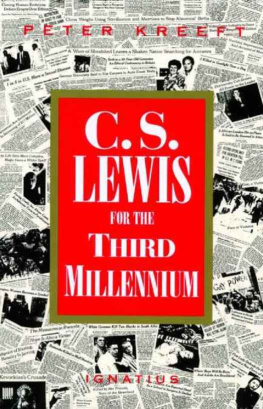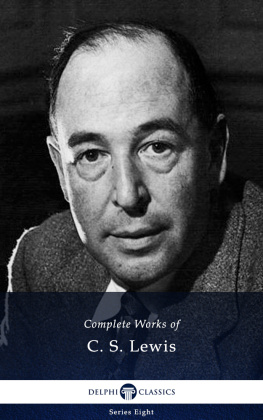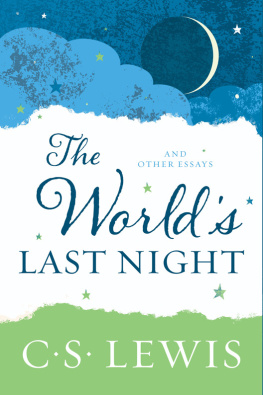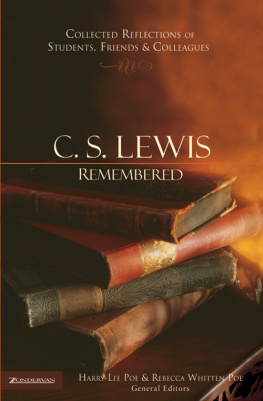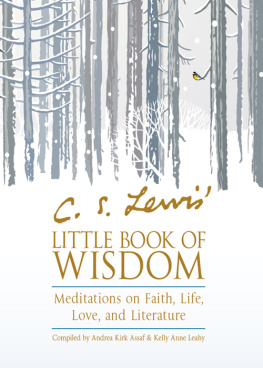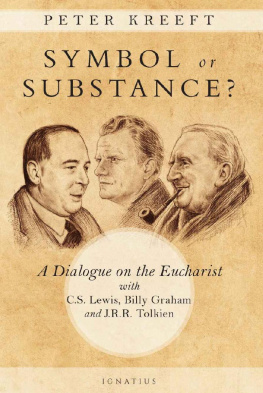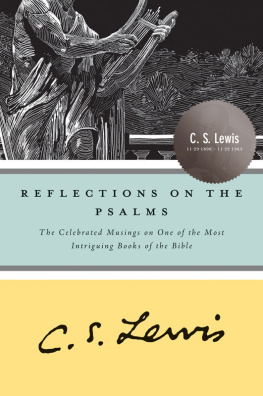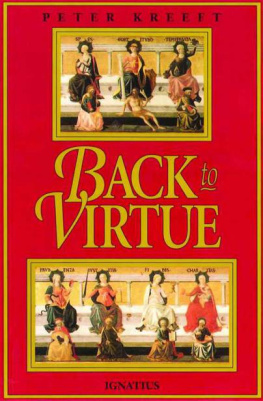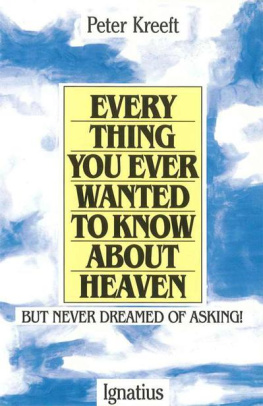Peter J. Kreeft - C.S.Lewis for the Third Millennium
Here you can read online Peter J. Kreeft - C.S.Lewis for the Third Millennium full text of the book (entire story) in english for free. Download pdf and epub, get meaning, cover and reviews about this ebook. year: 1990, publisher: Ignatius Press, genre: Religion. Description of the work, (preface) as well as reviews are available. Best literature library LitArk.com created for fans of good reading and offers a wide selection of genres:
Romance novel
Science fiction
Adventure
Detective
Science
History
Home and family
Prose
Art
Politics
Computer
Non-fiction
Religion
Business
Children
Humor
Choose a favorite category and find really read worthwhile books. Enjoy immersion in the world of imagination, feel the emotions of the characters or learn something new for yourself, make an fascinating discovery.
- Book:C.S.Lewis for the Third Millennium
- Author:
- Publisher:Ignatius Press
- Genre:
- Year:1990
- Rating:4 / 5
- Favourites:Add to favourites
- Your mark:
- 80
- 1
- 2
- 3
- 4
- 5
C.S.Lewis for the Third Millennium: summary, description and annotation
We offer to read an annotation, description, summary or preface (depends on what the author of the book "C.S.Lewis for the Third Millennium" wrote himself). If you haven't found the necessary information about the book — write in the comments, we will try to find it.
C.S.Lewis for the Third Millennium — read online for free the complete book (whole text) full work
Below is the text of the book, divided by pages. System saving the place of the last page read, allows you to conveniently read the book "C.S.Lewis for the Third Millennium" online for free, without having to search again every time where you left off. Put a bookmark, and you can go to the page where you finished reading at any time.
Font size:
Interval:
Bookmark:
C. S. LEWIS FOR THE
THIRD MILLENNIUM
PETER KREEFT
Third Millennium
Six Essays on
The Abolition of Man
IGNATIUS PRESS SAN FRANCISCO
Cover by Roxanne Mei Lum
1994 Ignatius Press, San Francisco
All rights reserved
ISBN 0-89870-523-1
Library of Congress catalogue number 94-75995
Printed in the United States of America
FOR WALTER HOOPER
WITH GRATITUDE
FOR GIVING THE WORLD
MANY OF LEWIS PRECIOUS WRITINGS
AND MUCH OF LEWIS GRACIOUS SPIRIT
CONTENTS
INTRODUCTION
As our senile, toothless, and confused culture stumbles blindly toward the third millennium; as our century of genocide comes to an end, having murdered more human beings (born and unborn) in a single century than the total of all men who lived in all previous centuries; as our demonic culture of death accelerates its sharklike feeding frenzy of human bodies and souls ; and as our arrogant and impenitent planet rushes naked and defenseless through space and time on a collision course with the fearsome heavenly body of the justice of God, we wonder: What next?and even whether there will be a next. We look for prophets.
I believe the two most prophetic books of our century are Aldous Huxleys Brave New World and C. S. Lewis Abolition of Man . If you want to see the third millennium, read these two books.
Lewis has one great advantage over Huxley: he is a Christian. Therefore he holds out hope, appeals to moral choice, and offers a positive alternative, though his jeremiad is no less horrific than Huxleys scenario of doom. But the hope, the alternative, and the choice are not limited to Christians. The spiritual war of this century is not among different religions but between all religions and none. That is why what is happening in Bosnia and Northern Ireland is not merely wicked, it is hopelessly out-of-date: a civil war breaking out in the ranks during a global and apocalyptic war against Hell. The Abolition of Man appeals to all men of good will and sound mind. So does this book: six essays about The Abolition of Man applied to our time and our future.
The first essay, How to Save Western Civilization: C. S. Lewis as Prophet, summarizes Lewis philosophy of history.
The second, Darkness at Noon: The Eclipse of The Permanent Things , summarizes our era from the standpoint of this philosophy.
The third, The Goodness of Goodness and the Badness of Badness, is a defense of the Natural Law, or objective values as the absolute sine qua non for the survival of civilization, and a summary of Lewis refutation of twenty alternatives to it.
The fourth, Can the Natural Law Ever Be Abolished from the Heart of Man?, puts Lewis in dialogue with Saint Thomas Aquinas on whether the abolition of man (i.e., man as moral) can ever happen.
The fifth, Walker Percys Lost in the Cosmos: The Abolition of Man in Late-Night Comedy Format, is some comic relief on the same heavy topics treated in chapters 1 through 4.
And the sixth, The Joyful Cosmology: Perelandras Great Dance as an Alternative World View to Modern Reductionism, fleshes out Lewis hopeful conclusion in The Abolition of Man : a new and humane world view or cosmology that is the necessary background for the new life view or morality. The newness is a restoration of the old. When radicalism is the establishment, the only really radical revolution is traditionalism.
The six essays are literally essays, explorations into the single most momentous question of our desperate times. I invite the reader to join me on my six little rafts following in the wake of Lewis pioneering ship to explore the whirlpools and rapids of this great, roaring river that is our common culture, now apparently headed for the falls. Whether and how it is possible to avert this fate is one of the few really relevant things to think about today.
C. S. Lewis as Prophet
Cars have windshields as well as rearview mirrors. So do civilizations. However, our rearward, Epimethean vision is far stronger than our forward, Promethean one. We have more archivists than prophets. For archivists see through a microscope, sharply, but prophets see through a glass, darkly.
Yet even the little the prophets see is of great importance to us. It is like the little but all-important view that a driver sees when peering through a tiny hole of light in a muddy windshield when the car is accelerating through thick fog over rocks and between abyssesin other words, when the situation is like that of our civilization.
The gift of prophecy, confined to a small number in Old Testament times, was offered to all Christians once the Holy Spirit, the One who makes and inspires prophets, was spread through the Church and into the world in the New Covenant. It is possible therefore without absurdity to call C. S. Lewis a prophet. Let us consult the writings of this most popular Christian author of our age with that hope in mind and look for some Lewis-light on our civilizational teeter, we who stand poised on the brink of spiritual suicide.
I extract twelve major principles about history from Lewis: five could be called a philosophy of history, four a description of history, and three a psychology of history. Then I apply these twelve principles to the issue of the future of mankind on this planet and draw a single conclusion from them. Finally, from this conclusion I derive a number of immediately practical applications for our present lives.
The first and most important principle of Lewis philosophy of history is that he disbelieves in the philosophy of history. In his Cambridge inaugural lecture De Descriptione Temporum, he said:
About everything that could be called the philosophy of history I am a desperate skeptic. I know nothing of the future, not even whether there will be any future.... I dont know whether the human tragi-comedy is now in Act I or Act V, whether our present disorders are those of infancy or old age.In his volume on the sixteenth century in the Oxford History of English Literature , he wrote:
Some think it is the historians business to penetrate beyond this apparent confusion and heterogeneity and to grasp in a simple intuition the spirit or meaning of his period. With some hesitation, and with much respect for the great men who have thought otherwise, I submit that this is exactly what we must refrain from doing. I cannot convince myself that such spirits or meanings have much more reality than the pictures we see in the fire.... The canals on Mars vanished when we got stronger lenses.And any reader of the above volume knows that Lewis has strong lenses.
Finally, from Reflections on the Psalms , here is the reason for Lewis skepticism about the philosophy of history:
Between different ages there is no impartial judge on earth, for no one stands outside the historical process; and, of course, no one is so completely enslaved to it as those who take our own age to be not one more period but a final and permanent platform from which we can see all other ages objectively.The Christian religion is like the history of the human race: messy, unpredictable, surprising, and lacking suspicious a priori lucidity, as Lewis puts it in Miracles :
Christianity, faced with popular religion, is continually troublesome... the real historian is similarly a nuisance when we want to romance about the old days or the ancient Greeks and Romans. The ascertained nature of any real thing is always at first a nuisance to our natural fantasies.Dont confuse me with facts; Ive made up my mind is a far more prevalent attitude than we like to think.
But once we give up fantasizing about history, we need not give up talking about it. Although our first Lewisian principle about the philosophy of history seems to exclude any further principles, it does not. It excludes only firm generalizations, dogmatic conclusions. Principles are not conclusions but starting points, principia . When we start to approach history, we need principles as one of the two blades of our mental scissors, if they are to cut through the mass of historical paper. We also need a lower, empirical blade, lest we project our a priori principles onto the facts. Principles without facts are empty, but facts without principles are blind.
Next pageFont size:
Interval:
Bookmark:
Similar books «C.S.Lewis for the Third Millennium»
Look at similar books to C.S.Lewis for the Third Millennium. We have selected literature similar in name and meaning in the hope of providing readers with more options to find new, interesting, not yet read works.
Discussion, reviews of the book C.S.Lewis for the Third Millennium and just readers' own opinions. Leave your comments, write what you think about the work, its meaning or the main characters. Specify what exactly you liked and what you didn't like, and why you think so.

